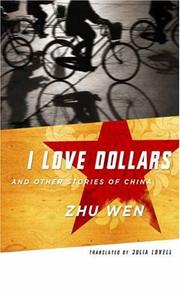| Listing 1 - 4 of 4 |
Sort by
|
Book
ISBN: 9780141033976 Year: 2008 Publisher: London : Penguin books,
Abstract | Keywords | Export | Availability | Bookmark
 Loading...
Loading...Choose an application
- Reference Manager
- EndNote
- RefWorks (Direct export to RefWorks)

ISBN: 0231136943 9780231136945 9786613008695 1283008696 0231510225 9780231510226 9781283008693 6613008699 Year: 2007 Publisher: New York, NY
Abstract | Keywords | Export | Availability | Bookmark
 Loading...
Loading...Choose an application
- Reference Manager
- EndNote
- RefWorks (Direct export to RefWorks)
In five richly imaginative novellas and a short story, Zhu Wen depicts the violence, chaos, and dark comedy of China in the post-Mao era. A frank reflection of the seamier side of his nation's increasingly capitalist society, Zhu Wen's fiction offers an audaciously plainspoken account of the often hedonistic individualism that is feverishly taking root. Set against the mundane landscapes of contemporary China-a worn Yangtze River vessel, cheap diners, a failing factory, a for-profit hospital operating by dated socialist norms-Zhu Wen's stories zoom in on the often tragicomic minutiae of everyday life in this fast-changing country. With subjects ranging from provincial mafiosi to nightmarish families and oppressed factory workers, his claustrophobic narratives depict a spiritually bankrupt society, periodically rocked by spasms of uncontrolled violence. For example, I Love Dollars, a story about casual sex in a provincial city whose caustic portrayal of numb disillusionment and cynicism, caused an immediate sensation in the Chinese literary establishment when it was first published. The novella's loose, colloquial voice and sharp focus on the indignity and iniquity of a society trapped between communism and capitalism showcase Zhu Wen's exceptional ability to make literary sense of the bizarre, ideologically confused amalgam that is contemporary China. Julia Lovell's fluent translation deftly reproduces Zhu Wen's wry sense of humor and powerful command of detail and atmosphere. The first book-length publication of Zhu Wen's fiction in English, I Love Dollars and Other Stories of China offers readers access to a trailblazing author and marks a major contribution to Chinese literature in English.
Book
ISBN: 9789888754052 988875405X Year: 2022 Publisher: Hong Kong Hong Kong University Press
Abstract | Keywords | Export | Availability | Bookmark
 Loading...
Loading...Choose an application
- Reference Manager
- EndNote
- RefWorks (Direct export to RefWorks)
Masculinity in literature --- Men in literature --- Zhu, Wen --- Feng, Tang --- Xu, Zechen --- Han, Han --- Criticism and interpretation.
Book
ISBN: 9888754777 9789888754779 Year: 2022 Publisher: Hong Kong : Hong Kong University Press,
Abstract | Keywords | Export | Availability | Bookmark
 Loading...
Loading...Choose an application
- Reference Manager
- EndNote
- RefWorks (Direct export to RefWorks)
Masculinity, fast-changing and regularly declared to be in the throes of crisis, is attracting more popular and scholarly debate in China than ever before. At the same time, Chinese literature since 1989 has been characterized as brimming with countercultural 'attitude'. This book probes the link between literary rebellion and manhood in China, showing how male writers, as they critique the outcomes of decades of market reform, also ask the same question: how best to be a man in the new postsocialist order?In this first full-length discussion of masculinity in post-1989 Chinese literature, Pamela Hunt offers a detailed analysis of four contemporary authors in particular: Zhu Wen, Feng Tang, Xu Zechen, and Han Han. In a series of insightful readings, she explores how all four writers show the same preoccupation with the figure of the man on the edges of society. Drawing on longstanding Chinese and global models of maverick and marginal masculinity, and responding to a desire to retain a measure of masculine authority, their characters all engage in forms of transgression that still rely heavily on heteronormative and patriarchal values. Rebel Men argues that masculinity, so often overlooked in literary analysis of contemporary China, continues to be renegotiated, debated, and agonized over, and is ultimately reconstructed as more powerful than before.
Hommes dans la litterature. --- Masculinite dans la litterature. --- Men in literature. --- Masculinity in literature. --- Zhu, Wen, --- Han, Han, --- Xu, Zechen, --- Feng, Tang, --- Criticism and interpretation.
| Listing 1 - 4 of 4 |
Sort by
|

 Search
Search Feedback
Feedback About UniCat
About UniCat  Help
Help News
News